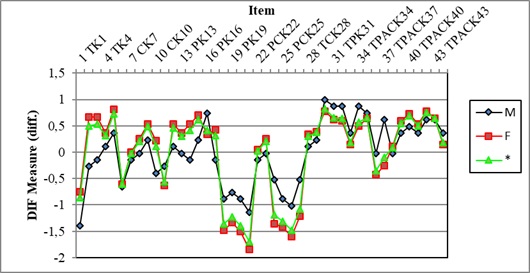The readiness of mathematics teachers in south sumatra province to conduct online learning from the TPACK perspective
DOI:
https://doi.org/10.23917/jramathedu.v8i4.1675Keywords:
Teacher readiness , Mathematics , Online learning , TPACKAbstract
Information and Communication Technology (ICT) use in digital-era learning leads to online learning. Implementing online learning requires a combination of skills from teachers in integrating pedagogical knowledge, subject matter mastery, and technological skills to create effective learning. This study aims to investigate the readiness of Mathematics teachers in the South Sumatra Province to conduct online learning from the TPACK perspective. This research is a survey type of study. The research subjects are Mathematics teachers in South Sumatra who teach Mathematics subjects at the primary, secondary, and high school levels. The sample used in this study amounted to 170 people. Based on the results discussed, Mathematics teachers in the South Sumatra Province are ready to conduct online learning based on the TPACK perspective. The highest readiness component for conducting learning is Technological Knowledge (TK), and the lowest is Technological Pedagogical and Knowledge (TPACK).
References
Asmuni, A. (2020). Problematika Pembelajaran Daring di Masa Pandemi Covid-19 dan Solusi Pemecahannya. Jurnal Paedagogy, 7(4), 281. https://doi.org/10.33394/jp.v7i4.2941
Azzahra, N. F. (2020). Mengkaji Hambatan Pembelajaran Jarak Jauh di Indonesia di Masa Pandemi Covid-19. https://repository.cips-indonesia.org/media/309163-mengkaji-hambatan-pembelajaran-jarak-jau-99409337.pdf
Bahador, Z. bin, Othman, N. bin, & Saidon, M. K. bin. (2018). Faktor-Faktor yang Mempengaruhi Pengintegrasian Teknologi Pengajaran Berdasarkan Model TPACK dalam Kalangan Guru Matematik. Proceedings of the ICECRS, 1(2), 66–73. https://doi.org/10.21070/picecrs.v1i2.1438
Baya’a, N., & Daher, W. (2012). Mathematics Teachers’ Readiness to Integrate ICT in the Classroom : The Case of Elementary and Middle School Arab Teachers in Israel. IMCL, 173–179. https://doi.org/10.1109/IMCL.2012.6396470
Benson, S. N. K., Ward, C. L., & Liang, X. (2015). The Essential Role of Pedagogical Knowledge in Technology Integration for Transformative Teaching and Learning. In C. Angeli & N. Valanides (Eds.), Technological Pedagogical Content Knowledge: Exploring, Developing, and Assessing TPCK (pp. 3–18). Springer. https://doi.org/https://doi.org/10.1007/978-1-4899-8080-9
Fajriana, & Safriana. (2021). Analisis Kesiapan Guru Fisika dan Matematika dalam Pembelajaran Daring. Jurnal Pendidikan Sains Indonesia, 9(2), 293–304. https://doi.org/10.24815/jpsi.v9i2.19162
Gess-Newsome, J. (2015). A MODEL OF TEACHER PROFESSIONAL KNOWLEDGE AND SKILL INCLUDING PCK: Results of the thinking from the PCK Summit. In A. Berry, P. Friedrichsen, & J. Loughran (Eds.), Re-examining Pedagogical Content Knowledge in Science Education (pp. 28–42). Routledge.
Heru, Yuliani, R. E., Nery, R. S., & Kesumawati, N. (2021). Pengembangan Instrumen Kesiapan Guru Matematika pada Pembelajaran Daring dalam Perspektif TPACK. AKSIOMA: Jurnal Program Studi Pendidikan Matematika, 10(3), 1360–1372. https://doi.org/https://doi.org/10.24127/ajpm.v10i3.3980
Kind, V. (2009). Pedagogical content knowledge in science education: perspectives and potential for progress. Studies in Science Education, 45(2), 169–204. http://dx.doi.org/10.1037/xge0000076
Kumar, N., Rose, R. C., & D’Silva, J. L. (2008). Teachers’ Readiness to Use Technology in the Classroom: An Empirical Study. European Journal of Scientific Research, 21(4), 603–616. https://doi.org/10.1504/IJMIE.2008.016228
Marbán, J. M., & Mulenga, E. M. (2019). Pre-service Primary Teachers’ Teaching Styles and Attitudes towards the Use of Technology in Mathematics Classrooms. International Electronic Journal of Mathematics Education, 14(2), 253–263. https://doi.org/10.29333/iejme/5649
Mishra, P., & Koehler, M. J. (2006). Technological Pedagogical Content Knowledge: A Framework for Teacher Knowledge. Teachers College Record, 108(6), 1017–1054. https://doi.org/10.1111/j.1467-9620.2006.00684.x
Mishra, Punya. (2019). Considering Contextual Knowledge: The TPACK Diagram Gets an Upgrade. Journal of Digital Learning in Teacher Education, 35(2), 76–78. https://doi.org/10.1080/21532974.2019.1588611
Msila, V. (2015). Teacher Readiness and Information and Communications Technology (ICT) Use in Classrooms: A South African Case Study. Creative Education, 06(18), 1973–1981. https://doi.org/10.4236/ce.2015.618202
NCTM. (2000). Principles and Standards for School Mathematics. The National Council of Teachers of Mathematics, Inc.
Phan, T. N. T., & Dang, L. T. T. (2017). Teacher Readiness for Online Teaching: A Critical Review*. The International Journal on Open and Distance E-Learning (IJODeL)), 3(1), 1–16.
Rahayu, D. V., Muhtadi, D., & Ridwan, I. M. (2022). Pedagogical Content Knowledge Guru dalam Pembelajaran Matematika Daring Mosharafa : Jurnal Pendidikan Matematika Mosharafa : Jurnal Pendidikan Matematika. 11, 281–292. https://doi.org/10.31980/mosharafa.v11i2.1386
Schmidt, D. A., Baran, E., Thompson, A. D., Mishra, P., Koehler, M. J., & Shin, T. S. (2009). Technological pedagogical content knowledge (Track): The development and validation of an assessment instrument for preservice teachers. Journal of Research on Technology in Education, 42(2), 123–149. https://doi.org/10.1080/15391523.2009.10782544
Sugiyono, P. D. (2016). metode penelitian kuantitatif, kualitatif,dan R&D. In Alfabeta, cv.
Sumintono, B., & Widhiarso, W. (2013). Aplikasi Model Rasch Untuk Penelitian Ilmu-Ilmu Sosial. Trim Komunikata Publishing House.
Sumintono, B., & Widhiarso, W. (2015). Aplikasi Pemodelan RASCH pada Assessment Pendidikan. Trim Komunikata Publishing House.
Termit Kaur, R. S., & Samli, C. (2014). Teacher Readiness on Ict Integration in Teaching-Learning : a Malaysian Case Study. International Journal of Asian Social Science, 4(7), 874–885. http://www.aessweb.com/journals/5007%0ATEACHER
Venkat, H., & Spaull, N. (2015). What do we know about primary teachers’ mathematical content knowledge in South Africa? An analysis of SACMEQ 2007. International Journal of Educational Development, 41, 121–130. https://doi.org/10.1016/j.ijedudev.2015.02.002
Wuryaningsih, Susilastuti, D. H., Darwin, M., & Pierewan, A. C. (2019). Effects of web-based learning and F2F learning on teachers achievement in teacher training program in Indonesia. International Journal of Emerging Technologies in Learning, 14(21), 123–147. https://doi.org/10.3991/ijet.v14i21.10736
Yuliani, R. E., & Heru. (2021). E-Course Design of Middle/MTs Teacher Training Using Google Classroom. International Journal of Elementary Education, 5(3), 350–358. https://ejournal.undiksha.ac.id/index.php/IJEE/article/view/37667

Downloads
Submitted
Accepted
Published
How to Cite
Issue
Section
License
Copyright (c) 2024 Refi Elfira Yuliani, Heru Heru

This work is licensed under a Creative Commons Attribution-NonCommercial 4.0 International License.


















